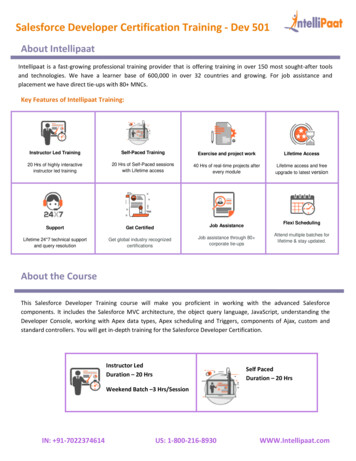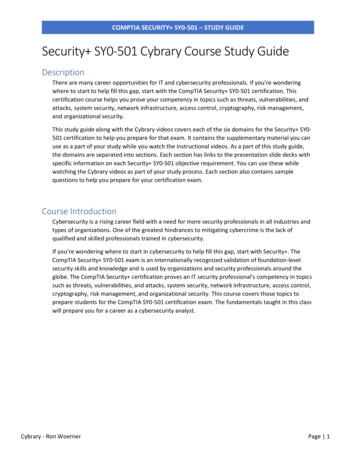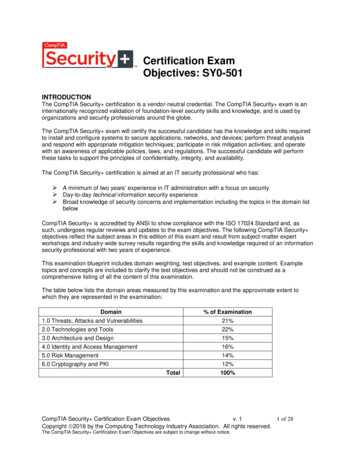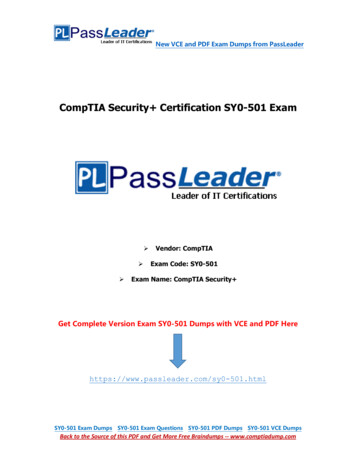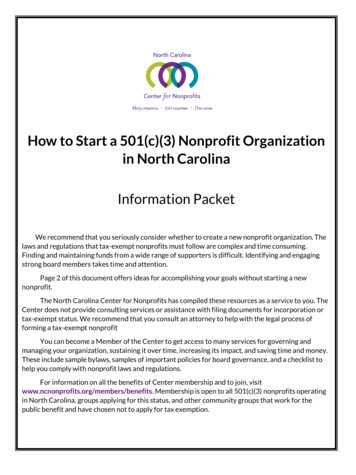
Transcription
How to Start a 501(c)(3) Nonprofit Organizationin North CarolinaInformation PacketWe recommend that you seriously consider whether to create a new nonprofit organization. Thelaws and regulations that tax-exempt nonprofits must follow are complex and time consuming.Finding and maintaining funds from a wide range of supporters is difficult. Identifying and engagingstrong board members takes time and attention.Page 2 of this document offers ideas for accomplishing your goals without starting a newnonprofit.The North Carolina Center for Nonprofits has compiled these resources as a service to you. TheCenter does not provide consulting services or assistance with filing documents for incorporation ortax-exempt status. We recommend that you consult an attorney to help with the legal process offorming a tax-exempt nonprofitYou can become a Member of the Center to get access to many services for governing andmanaging your organization, sustaining it over time, increasing its impact, and saving time and money.These include sample bylaws, samples of important policies for board governance, and a checklist tohelp you comply with nonprofit laws and regulations.For information on all the benefits of Center membership and to join, visitwww.ncnonprofits.org/members/benefits. Membership is open to all 501(c)(3) nonprofits operatingin North Carolina, groups applying for this status, and other community groups that work for thepublic benefit and have chosen not to apply for tax exemption.
Alternatives to Starting a NonprofitEstablishing a new nonprofit corporation and maintaining the required administrative, regulatory, legal, andfinancial support can be very difficult. Funding a nonprofit on a long-term basis is also a big challenge,especially with funders' growing concern about duplication. Before you decide to create a new, separatenonprofit, we suggest that you talk with existing nonprofits that have goals similar to yours. Consider creatinga project or program within another organization rather than spending your time and energy to establish awhole new entity. Funders are reluctant to invest in new organizations without a track record, especiallyduring challenging economic times, and it behooves all parties to work within existing structures.Many nonprofits begin and end without ever achieving their vision. Can you achieve yours without startinga new organization?1. Become a volunteer, board member, or even a staff member with a nonprofit already active in your area.2. Identify three nonprofits most compatible with your ideas. Explore creating a special project orinitiative, and negotiate how you can be involved.3. Look at national organizations working in your area of interest and start a local chapter.4. If your effort will be quite local and small, form an unincorporated association or club. Have meetingsand activities, but skip the reporting requirements if your annual budget stays under 25,000.5. If you want to finance scholarships, family emergency funds, or others' activities and needs, establish afund at a community foundation or organization.– Jon PrattJon Pratt is executive director of the Minnesota Council of Nonprofits. Reprinted with permission.
Creating a 501(c)(3) Nonprofit in North CarolinaInitial Planning Is your nonprofit needed? Carefully assess the need for your proposed nonprofit organization. Before you decide tocreate a new, separate nonprofit, talk with existing nonprofits that have goals similar to yours. Consider creating aproject or program within another organization rather than spending your time and energy establishing a neworganization. Establish a Board of Directors. If you are sure a new organization is really needed, the next step is to establish a Boardof Directors. North Carolina law requires only one board member, but best practices recommend that you have nofewer than five; seven or more are preferable. As you recruit board members, make sure they are aware of their roles and responsibilities. These includebut are not limited to: selecting and reviewing the performance of the chief executive; recruiting new boardmembers; ensuring effective organizational planning; evaluating organizational performance; providingfinancial oversight; and ensuring legal and ethical integrity. A first priority for the board is to clarify the organization’s mission and purpose. The board must determineboth its short-and long-term goals by identifying who the organization will serve, clarifying what values willdrive organization, d planning for how the organization’s mission may evolve.Steps to Establish Your Nonprofit Incorporate by filing articles of incorporation with the N.C. Department of the Secretary of State. For forms and freeinformation, including guidelines for incorporating: 1-888-246-7636 or 919-807-2225 orwww.secretary.state.nc.us/corporations. Before applying for tax-exempt status, you need to create organizational bylaws. It’s helpful to review those ofexisting nonprofits and to have a lawyer review them before they’re finalized. You’ll need to have an initial meeting ofthe board of directors to adopt the bylaws. Apply for a Federal Employer Identification Number (EIN) even if your nonprofit doesn’t have employees. This EIN isused by the IRS to track reports and your Form 1023 tax-exempt application (see below). To apply, submit IRS FormSS-4 either online, by phone, by mail, or by fax. Call the IRS’s Business & Specialty Tax Line (1-800-829-4933) or seewww.irs.gov/businesses/small/article/0,,id 97860,00.html. Next, apply for tax-exempt status as a 501(c)(3) nonprofit. The Form 1023 and instructions are available athttp://www.irs.gov/Forms-&-Pubs. We strongly recommend you have an attorney and an accountant/CPA familiar withnonprofit tax law review your application before final submission. You should hear back from the IRS in 3-24 months. If your organization has annual gross receipts of 50,000 or less and total assets of 250,000 or less, you may be ableto file the 1023-EZ. After receiving tax-exempt status, apply to the N.C. Department of Revenue for exemption from state corporateincome tax and franchise tax. If your organization will have paid employees, get a State Withholding IdentificationNumber (you must begin withholding taxes as soon as you begin paying employees). Contact the N.C. Department ofRevenue at 1-877-252-3052. You are required to carry workers’ compensation insurance once you have three full -or part-time employees and/orcorporate officers (including uncompensated board officers). Contact the North Carolina Industrial Commission (1800-688-8349, www.ic.nc.gov) for information on how to obtain coverage. 2015 North Carolina Center for NonprofitsContinued on next page
File with the N.C. Employment Security Commission (919-707-1150, www.ncesc.com) for unemployment taxes whenyou have at least four full-or part-time employees working a total of 20 weeks in one calendar year. Apply for anUnemployment Tax Number and then file the Employer’s Quarterly Tax and Wage Report. 501(c)(3) nonprofits mayelect to reimburse for unemployment claims rather than pay unemployment taxes. Apply for local property tax exemption by contacting your local County Tax Office. Even if property tax exemption isgranted, it is still necessary to file a complete property listing by January 31. Finally, make sure you apply for a Charitable Solicitation License through the Solicitation Licensing Branch of the N.C.Department of the Secretary of State (1-888-830-4989 or 919-807-2214, www.secretary.state.nc.us/csl) if you will beraising 25,000 or more in one calendar year. If you receive less than that amount, you still need to apply to becomeexempt from requiring the license. Every nonprofit must contact the Secretary of State each year.Ongoing Legal Requirements Report to the IRS. Nonprofits with annual gross receipts of 50,000 or less must file an e-Postcard annually. If your annualbudget is less than 5,000 and you’ve never applied for 501(c)(3) tax-exempt status, you still need to file(you won’t be penalized for filing late). Call IRS Customer Account Services, 1-877-829-5500. Nonprofits with annual gross receipts of more than 50,000 or with an average of more than 50,000 overthe past three years must file a Form 990 or 990-EZ annually within 5 ½ months after your fiscal year ends.All supporting or controlling organizations must file Form 990 or 990-EZ. Nonprofits with annual gross receipts under 200,000 and total assets under 500,000 can file form 990EZ. Private foundations must file a 990-PF. Churches, their integrated auxiliaries, and conventions or associations of churches don’t need to file.These forms are available on the IRS website, nd-Instructions andepostcard.form990.org. Nonprofits that fail to file their e-Postcard, 990, or 990-EZ for three consecutive years willautomatically lose their tax-exempt status. Call 1-877-829-5500 or your CPA for details. Renew your organization’s Charitable Solicitation License and tax-exempt status. The license must be renewed annually,within 5.5 months after the end of your fiscal year. If you are exempt from having the license, you generally still needto contact the Secretary of State each year. Collect sales tax on items sold. If your nonprofit sells retail items, register with the N.C. Department of Revenue for aCertificate of Registration, file Form E-500, and pay the tax due on a quarterly or monthly basis, depending on yourvolume of sales. Contact the Taxpayer Assistance Division, 1-877-252-3052 or www.dornc.com. Your nonprofit maybe eligible for semi-annual refunds of sales taxes paid. When needed, update your principal office address and registered agent with the N.C. Secretary of State. For a Change ofRegistered Office/Agent form, call the N.C. Department of the Secretary of State ns). Follow all state and federal laws related to employment, including I-9, W-2, and W-4 forms; withholding taxes; andposting all compliance posters. For free compliance posters, call the U.S. Department of Labor, 866-4-USADOL andthe N.C. Department of Labor, 1-800-NC-LABOR. You can download posters at www.nclabor.com/posters/posters.htm. 2015 North Carolina Center for NonprofitsContinued on next page
Resources How to Form a Nonprofit Corporation, Anthony Mancuso (Nolo Press, www.nolo.com). The Nonprofit Handbook, Gary Grobman (White Hat Communications, 717-238-3787,www.whitehatcommunications.com). Chapter 55A North Carolina Corporation tes/html/bychapter/chapter 55a.html. Principles & Practices for Nonprofit Excellence: A Self-Help Tool for Nonprofit Organizational s/principles), published by the North Carolina Center for Nonprofits. Providesspecific benchmarks of best practices around planning, governance, human resources, financial management,fundraising, information and technology, evaluation, strategic alliances, civic engagement and public policy, andtransparency and accountability.Want more help with nonprofit issues and information? Join the North Carolina Center for Nonprofits. For a modestannual fee ( 95 to 1,500, depending on your expenses), your board and staff can access a broad array of informationthrough our website, Assistance, pro bono programs, workshops and conferences, and more. Just one of our services –theInformation Central section of our website, available 24/7 --has thousands of answers and/or resources at our Members’fingertips! Join at www.ncnonprofits.org, or call 919-790-1555 ext. 100.North Carolina Center for Nonprofits, www.ncnonprofits.org (919-790-1555, ext. 100) 2015 North Carolina Center for Nonprofits
The following was excerpted from Guidebook for Boards of Directors of North Carolina Nonprofit Corporations (2ndEdition). We recommend that those interested in forming a 501(c)(3) nonprofit read the entire guidebook, which isavailable to Center Members at rectors-northcarolinanonprofits.Part 3The Duties and Liabilities of Nonprofit Board Members – Take NoteThis part describes: the basis of legal liabilities for nonprofit boardmembers the nature of board members’ “fiduciary duties” the enforcement of legal liabilities against nonprofitboard members the protections against individual board memberliabilityBoard member liability is an important matter and one that should give any nonprofit board member pause. Youshould understand how nonprofit board members might become personally liable. You should be familiar withyour fiduciary duties and how to carry them out, as well as how you might become legally liable for breachingyour duties. You should know what protections are available to you and make sure your nonprofit has these inplace.3.1 How might a nonprofit board member become liable?Nonprofit board members may become liable as a result of their corporate role in three ways: cLiability to the nonprofit corporation (or person suing on its behalf). Board members may be liable forbreaching their corporate or fiduciary duties, which are enforceable in a lawsuit brought by the nonprofitcorporation or someone suing on its behalf – often a member or another key stakeholder.Liability for corporate harm. Board members may be liable for having participated in a corporate decisionthat directly harms somebody, such as negligently authorizing a dangerous policy that resulted in injuries ata day care center.Liability for violating statutory requirements. Board members may be directly liable for making decisions ortaking actions that violate statutory provisions dealing with such matters as environmental protection, taxcompliance, or antitrust law.3.2 What are a nonprofit board member’s fiduciary duties?Fiduciary duties are at the core of the American corporation, including nonprofits. As a nonprofit board member,you have duties to the corporation and its stakeholders. Some of these duties are legally enforceable in court,and they create the potential for personal liability. Some of the fiduciary duties are merely aspirational and arenot enforceable in court, but failing to comply with them disserves the nonprofit and can be the basis for your notcontinuing as a board member.There are three fiduciary duties. The duty of care describes the attention and judgment you are expected toexercise in performing your board member functions. The duty of loyalty arises when you or another boardmember has a personal interest that conflicts with the nonprofit’s interests. The duty of obedience requires board
members to comply with the nonprofit’s governing principles as contained in its corporate documents.Duty of care. Under North Carolina law, board members must discharge their duties with “the care an ordinarilyprudent person in a like position would exercise under similar circumstances.” What does this mean? Here aresome guidelines:You should attend board meetings. Board members act as a group, and your attendance at board andcommittee meetings is important. Even if you perform other tasks for the nonprofit like soliciting fundsor participating in a specific program, repeated absences from board meetings shows indifference andmay violate your duty of care.You should become informed. You should read the information presented to you before and at meetings.You should be curious. Generally this information will come from the nonprofit’s staff, and you mustdecide whether it is sufficient. If not, you should request additional information. If you are notadequately informed, you may violate your duty of care.You can rely on trustworthy information. You are expected to be familiar with the financial, legal, andoperational issues facing the nonprofit, but you are not expected to be an expert. By law, you may rely on“reports, communications and information received from another board member, a committee or fromany officer employee or agent” – if you believe the source to be reliable and competent. If you knowsomething that contradicts this information, or if your reliance is otherwise unreasonable, you may beheld to have violated your duty of care.You should exercise independent judgment. Group-think is a danger in any decision-making body. As aboard member, you should be objective and independent. Your responsibilities are to the nonprofit as awhole, not any particular person (such as the nonprofit’s executive director) or any particularconstituency.You should monitor the nonprofit’s activities. The board delegates the conduct of the nonprofit’s dayto-day operations to the nonprofit CEO/ED, staff, and sometimes outside agents. You are responsible foroverseeing these operations. You should be inquisitive. You should insist on regular reports, and youshould act if you believe there is mismanagement, illegality or other improprieties.This describes what you should do. But many of these duties of care are aspirational and not enforceable incourt. Under the business judgment rule, a nonprofit director who exercises good faith judgment will usually beprotected from liability to the corporation and its members. This is true even if the corporate action turns outto be unwise or unsuccessful. (This judicial policy not to “second guess” nonprofit board members has beenrecognized in other states, but no North Carolina court has yet had an opportunity to apply it here.) The businessjudgment rule does not apply in cases of criminal activity, fraud or willful misconduct.“Good Practices” PointerSome courts have said that the business judgment ruledepends on board members making informed decisions. Toget the protection of the rule, well-advised boards insist onreceiving written reports and professional advice beforemaking important decisions. This creates a record ofresponsible, attentive decision-making.Your duty of oversight includes ensuring the nonprofit complies with the law – such as health and safetystandards, mandatory insurance coverage, and tax reporting rules. If you believe the nonprofit is not incompliance or is engaged in illegal activities, you should point this out to the nonprofit’s chief executive anddemand an investigation and action. If this does not happen, you should bring the issue to the full board. If the
board fails to act, you should have your dissent recorded in the minutes and you should consider resigning fromthe board.“Good Practices” PointerIf you become aware of illegal activity that is not corrected,you may have legal obligations to disclose the matter togovernment authorities. You should consult an attorney onyour obligations and your options.In addition to monitoring for legal compliance, you are also obligated to monitor for improper managementactivities. If you suspect activities such as embezzlement of nonprofit funds, financial misreporting, undisclosedself-dealing transactions, unauthorized activities, or other improper behavior by the nonprofit’s CEO/ED or staff(or other board members), you should bring the matter to the chief executive or the full board. This will oftenpresent an uncomfortable situation, but your role as “watchdog” for the nonprofit is one of the most importantyou have. If the matter is not resolved, you should consider resigning.Nonprofits, particularly private foundations, often oversee the investment and disbursement of large amountsof money. Under what standard are the nonprofit’s investment policies judged? Under North Carolina law, as of2007, educational, religious, and charitable organizations may: invest in any property deemed advisable by the board of directors, whether or not it produces a currentreturn retain contributed property for as long as the board of directors deems advisable include contributed funds in any pooled or common fund maintained by the nonprofit corporation invest all or part of the funds in
corporate officers (including uncompensated board officers). Contact the North Carolina Industrial Commission (1-800-688-8349, www.ic.nc.gov) for information on how to obtain coverage. 2015 Nort
